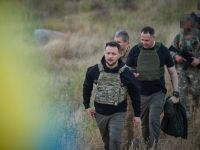Iraqi scientists are refusing private interviews with U.N. inspectors despite the strong urgings of the Iraqi government, a senior Iraqi official said Thursday.
On his part, U.S. Deputy Defense Secretary Paul Wolfowitz said that Iraqi President Saddam Hussein had threatened cooperative scientists with death. Chief U.N. weapons inspector Hans Blix, meanwhile, complained Iraq was still not complying fully with U.N. demands.
"Today we know from multiple sources that Saddam has ordered that any scientist who cooperates during interviews will be killed, as well as their families," Wolfowitz said in New York.
Despite the scientists' balking at interviews, Lt. Gen. Hossam Mohammed Amin said Baghdad hopes the chief U.N. inspectors will submit a progress report to the Security Council that falls short of declaring Iraq in material breach of the latest U.N. disarmament resolution.
Amin said the government had encouraged a half-dozen scientists to meet privately with the inspectors, but the scientists had refused.
"As we promised, that we shall encourage the scientists to make interviews, we did our best to push the scientists," Amin said. "But they refused to make such interviews without the presence of (Iraqi) officials."
During a news conference, Amin said top inspectors Hans Blix and Mohamed ElBaradei, head of the U.N. nuclear agency, had "exaggerated" differences between them and the Iraqi government after talks in the Iraqi capital on Sunday and Monday.
Amin noted that Blix said after Monday's talks that outstanding issues included Iraq's refusal to allow reconnaissance overflights by U.S. U-2 spy planes to help the U.N. inspectors' hunt for banned weapons programs.
"He accused us of putting unnecessary conditions and so forth, which is inaccurate," said Amin, the chief liaison with the U.N. weapons monitors.
Amin said U.S. surveillance aircraft that flew missions in support of U.N. inspections in the 1990s spied on Iraq's "conventional defense capabilities" and gave the information to the CIA.
According to AP, he said Iraq was simply seeking "safeguards" that would "secure our right to defend our sky and our ground." He noted that U.S. and British jets still patrol no-fly zones over Iraq — which Baghdad maintains are illegal — and that the presence of American spy planes in Iraqi skies would "complicate the air defense project."
In New York, however, Blix repeated his complaints about Iraqi cooperation, especially on the surveillance flights issue. Blix said his teams were gaining access to sites but Baghdad still wasn't fully cooperating.
"I realize there are things that have gone well like access and setting up infrastructure. But there are other areas where we are not satisfied and the U-2 is one of them," Blix said. (Albawaba.com)
© 2003 Al Bawaba (www.albawaba.com)







